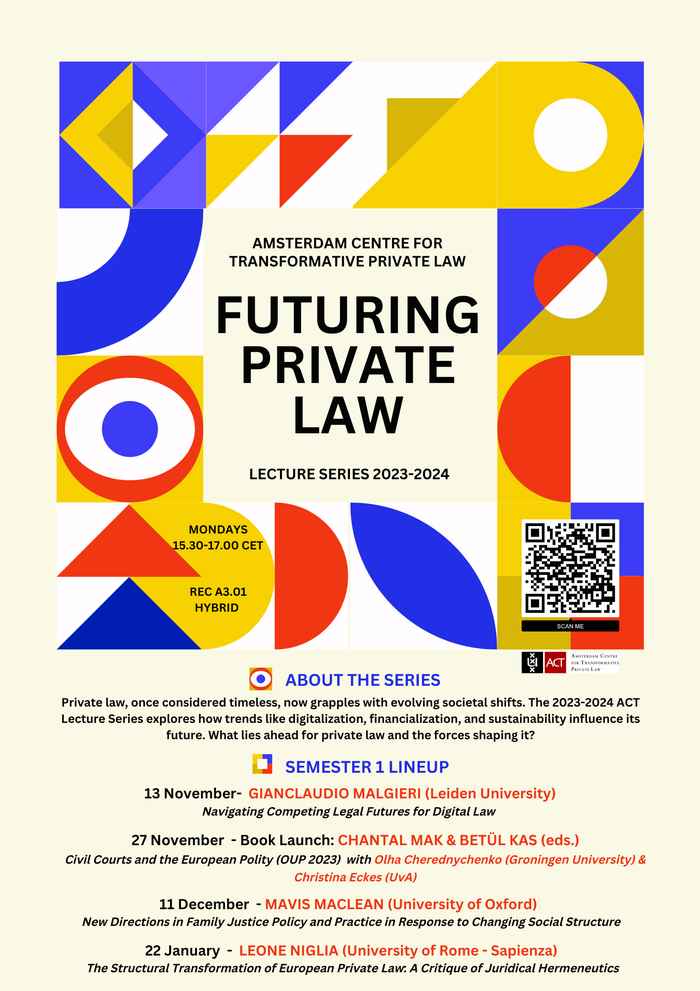Futuring Private Law Lecture Series with Gianclaudio Malgieri (Leiden University)
Amsterdam Center for Transformative Private Law
- Date
- 13 November 2023
- Time
- 15:00 -16:40
- Location
- Roeterseilandcampus - building A
- Room
- TBD

About the Speaker
Dr Gianclaudio Malgieri is an Associate Professor of Law and technology at Leiden University, where he is a Board Member of the eLaw Center for Law and Digital Technologies. He serves as the Co-Director of the Brussels Privacy Hub, as an Associate Editor of Computer Law and Security Review (Elsevier), and co-leads “VULNERA“, the International Observatory of Vulnerable People in Data Protection. He is an external ethics expert for the European Commission and is a programme committee member of the PLSC (Privacy Law Scholarship Conference), and an Advisory Board member of Epic.org. Gianclaudio has authored over 60 publications, including articles in leading international academic journals and a monograph, “Vulnerability and Data Protection Law” (Oxford University Press, 2023). His works have been cited by, inter alia, top international newspapers (The New York Times, The Washington Post, Le Monde, Politico, La Tribune) and European and International Institutions.
Abstract
This essay provides a legal-economic canvas of the institutional co-evolutionary dynamics that are disrupting the legal foundations of digital markets to make sense of contested 'commodification bets' from personal data to AI. Drawing from the experience of information capitalism, we make a general argument about the anomalous coordination between legal, technological, and economic dynamics, which is reinforced by the over-reliance on co-regulatory strategies proposed by current regulatory measures (e.g., the European AI Act proposal) as a solution to regulate disruptive technologies. It is argued that the co-regulatory model exacerbates legal instability in emerging markets, as it is subject to moral hazard dynamics, all too favored by an over-reliance on the goodwill of private actors as well as on the enforcement priorities of Member States’ DPAs. Stalling strategies, and regulatory captures can flourish within such a model to the advantage of economic agents' commodification bets, thus prolonging what we call the 'extended legal present', in which a plurality of possible legal futures compete with each other, and which is fraught with economic and political uncertainty. The first part briefly recounts how the fundamental commodification bets over personal data at the core of the digital economy have been deployed and partly rejected by the EU judiciary and Data Protection Authorities, pointing to the poor adaptation of economic agents' legal practices despite the emerging legal fault lines at the heart of European digital markets. The second part outlines a theoretical framework for the functioning of the 'market for legal rules' that the co-regulatory model allows to make sense of and explain the current legal-economic drifts. It also highlights the presence in the legal domain of anomalies and distortions typically associated with market exchanges in general. The third part juxtaposes such a theoretical framework with the current flares of legal uncertainty surrounding the commercial release of AI-based products to highlight the sense of déjà vu in the creation of the legal foundations for AI and to call for a course correction in the over-reliance on co-regulation. It concludes with several policy considerations, including institutional diversification as a resilient strategy in the face of legal uncertainty to avoid possible "legal bubbles" in the making.
Online Attendance
This lecture will be held in REC A3.01 and online via zoom. To join online, please register via the button below and make sure to select the add-on for the zoom link when checking out. Thank you.
